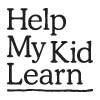What to do with this activity?
Storyline Online is a wonderful resource organised by the Screen Actors Guild of America. Professional actors have recorded lots of children's stories on video. Click here to choose a story to watch and listen to with your child. Real books are great for your child, but this is an enjoyable alternative.
Each video shows the illustrations from the book, and the words of the book appear at the bottom of screen. Sit down with your child and follow the words with your fingers, or let them read along with the actor. If you are not a confident reader yourself, listening to an actor might help you both.
Stop and start the video as you need, especially if your child is asking questions, or if there is a word they don't know. Talk about the story afterwards - did they like the main character; what was their favourite bit; was it a good ending? If your child really likes one of the books, you can search for books by the same author.
And don't forget that you can join your local library and borrow books for free.
-
Why am I doing this?
The written word is everywhere and by pointing out words around you everyday, your child will realise the usefulness of reading and how it brings information and knowledge of the wider world into your lives.
Reading together shows your child that you think reading is important. It helps your child to link the words on the page to how they are spoken and to begin to recognise words.
-
How can I do more?
Encourage your child to read by giving them books or information about what they are interested in, for example, if they are interested in cars, give them books about cars – it’s a great motivator. Use comics, magazines and newspapers to provide lots of new words and facts. Your child can use the pictures for information about the words they are reading.
Read longer books to your child. This will help with memory.
You could do ‘paired reading’ – your child chooses a book or comic to read.
- At first, both of you read aloud together. When the child is ready, they carry on reading alone.
- If they don’t know a word, you say it for them and both of you continue to read together until they are ready to read alone again.
- No pressure is made to get them to read by themselves. They only do it when they are ready. This is useful with older children when they find text books difficult.Your child might like to practise their reading skills by reading to younger children.
Discuss with your child’s teacher if they are having difficulty reading.
Rate this activity
![]()
![]()
![]()
![]()
![]()
Based on 1 review
How would you rate it?
1 = Poor, 5 = Great.



